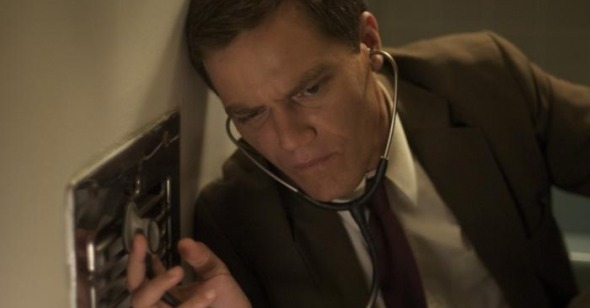Way Gone
by Justin Stewart
The Missing Person
Dir. Noah Buschel, U.S., Strand Releasing
Updating the private investigator film with September 11 shadings is not a terribly novel idea, but writer/director Noah Buschel isn't an idea man. He likes feelings, atmosphere, actors, and emotion, and he originally said he was inspired to make The Missing Person because he was reading Raymond Chandler around the time of the attacks—but then he told indieWIRE that he was being slightly disingenuous when he originally said this, as his motivations were more vague. Buschel's deprioritzing of tagline-ready storytelling mechanics is evident as his movie gawkily transitions between various plots. Surprisingly, it's two elements that might seem like drawbacks that glue the pieces together and (somewhat) sustain the appeal of this mess—the consistently ugly graininess of the HDCAM and super-16 (itself digitally altered to look like DV) and Michael Shannon's rewardingly repetitive performance.
The movie opens blurrily on a hung-over John Rosow (Shannon) awoken by a phone call in his dirtbag Chicago apartment located right by an elevated train. A lawyer on the other end offers him a job trailing a guy and a kid to Los Angeles. Amy Ryan's oddly named Miss Charley then knocks on the door with a cash advance and some more detailed instructions. Using a paper funnel, Rosow (like “sorrow” inverted) fills a flask with gin, puts on a dark suit, and is soon on a train with his mark, Harold, and the kid. A drunk dream involving snow falling inside a church (the intense graininess drains the intended magic out of these particular images, even if it works well elsewhere) is our first hint that the movie won't be an A-to-B conflict-resolution situation.
In L.A., Shannon plays up his character’s from-another-era peculiarity. Goofily exaggerated at times (he's utterly baffled by camera phones), he has a funny encounter with a cop on a Segway ("No smoking on the promenade, fuckwad") and picks up a slippery femme fatale at a bar, during which it’s clear Rosow isn't as drunk or oblivious as he seems. For Rosow, like Shannon, is playing a character, and he's occasionally called out. "Is that a Bogart joke?" asks one woman who sees through his chain-smoking and sardonicism. “It's my sad attempt,” he replies. Rosow's tracking of Harold eventually leads him near the Mexican border, where he raps with a cabbie about the real Officer Serpico and their shared hometown of New York City, where rising rents have driven out natives (“I can't even afford Red Hook,” says the hack).
[Spoilers ahead] Rosow eventually learns that Harold is in fact acting altruistically, bringing these abandoned children to orphanages, but since he wants the reward, John still lugs him back to New York. It turns out Harold fled the city and his family after being presumed killed in the 9/11 attacks, which strikes a chord with Rosow. At this point, with yet more characters to be introduced, The Missing Person seems to be biting off more than it can chew, and it never successfully makes the sought connection between its tipsy cross-country P.I. first half and the second half, a drama seeped in despair with a very specific source.
But Shannon's perpetual watchability makes it go down easy. As in Shotgun Stories, he doesn't say much, letting his pinched, all-brow expressions and lanky frame express both his intelligence and strength. His Rosow drinks, you realize, not only because his wife's dead, but to dull the detective's mental hell of noticing everything, all the time. Shannon's lines are grunted, not spoken, and his constant coolness during confusion grounds the film. Amy Ryan, who receives overexcited notices because she's an actress who can keep a straight face and is not overly pretty, turns in her usual blandness. Paul Sparks adds some cocky personality late into the movie as Rosow's former colleague.
The Big Sleep proved in 1946 that Buschel's aforementioned preferred concerns can matter more than narrative—its plot was incoherent, yet it's still probably the genre's high water mark. The Missing Person is far less conceptually interesting than subsequent detective story updates like The Long Goodbye, The Big Lebowski, or Charles Willeford's Hoke Moseley books. It's more of a modest, Red Rock West–ish affair, and it has a likable guilelessness similar to Busch's emo high-schooler movie Bringing Rain. If it were less confused about what it wanted to be, The Missing Person might have been great.
